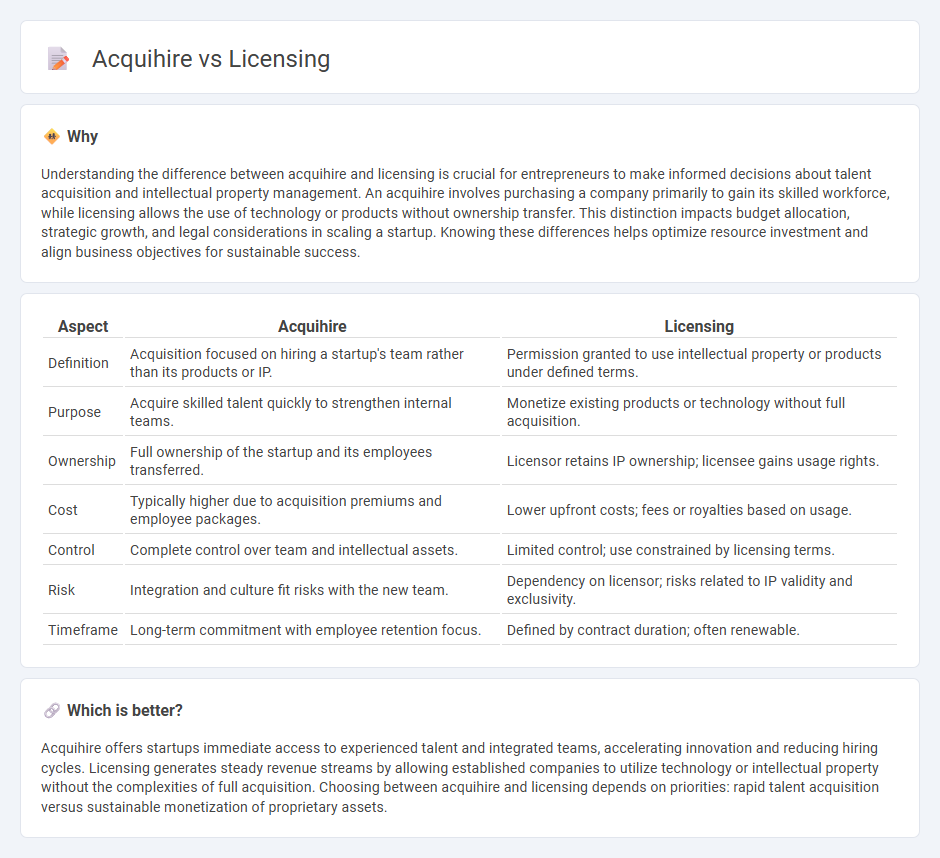
Acquihire involves acquiring a company primarily to gain its skilled talent, focusing on expertise integration rather than product acquisition. Licensing allows a business to legally use another company's intellectual property while maintaining independent operations, enabling innovation without full ownership. Explore the strategic benefits and key differences between acquihire and licensing in entrepreneurship.
Why it is important
Understanding the difference between acquihire and licensing is crucial for entrepreneurs to make informed decisions about talent acquisition and intellectual property management. An acquihire involves purchasing a company primarily to gain its skilled workforce, while licensing allows the use of technology or products without ownership transfer. This distinction impacts budget allocation, strategic growth, and legal considerations in scaling a startup. Knowing these differences helps optimize resource investment and align business objectives for sustainable success.
Comparison Table
| Aspect | Acquihire | Licensing |
|---|---|---|
| Definition | Acquisition focused on hiring a startup's team rather than its products or IP. | Permission granted to use intellectual property or products under defined terms. |
| Purpose | Acquire skilled talent quickly to strengthen internal teams. | Monetize existing products or technology without full acquisition. |
| Ownership | Full ownership of the startup and its employees transferred. | Licensor retains IP ownership; licensee gains usage rights. |
| Cost | Typically higher due to acquisition premiums and employee packages. | Lower upfront costs; fees or royalties based on usage. |
| Control | Complete control over team and intellectual assets. | Limited control; use constrained by licensing terms. |
| Risk | Integration and culture fit risks with the new team. | Dependency on licensor; risks related to IP validity and exclusivity. |
| Timeframe | Long-term commitment with employee retention focus. | Defined by contract duration; often renewable. |
Which is better?
Acquihire offers startups immediate access to experienced talent and integrated teams, accelerating innovation and reducing hiring cycles. Licensing generates steady revenue streams by allowing established companies to utilize technology or intellectual property without the complexities of full acquisition. Choosing between acquihire and licensing depends on priorities: rapid talent acquisition versus sustainable monetization of proprietary assets.
Connection
Acquihires often include licensing agreements to secure intellectual property rights during the acquisition of a startup, ensuring uninterrupted use of key technologies. Licensing facilitates the legal transfer of proprietary software or patents critical for integrating the acquired team's innovations into the parent company. This strategic combination enhances product development and accelerates market entry by leveraging both talent and technology assets.
Key Terms
Intellectual Property
Licensing allows companies to monetize intellectual property by granting usage rights while retaining ownership, preserving control over patents, trademarks, and copyrights. Acquihire combines talent acquisition with ownership transfer of IP assets, often resulting in full control over proprietary technology and innovations. Explore how licensing and acquihire strategies impact your intellectual property management and business growth.
Talent Acquisition
Licensing involves obtaining rights to use intellectual property, while acquihire focuses on acquiring talent by purchasing a company primarily for its skilled employees. In talent acquisition strategies, acquihire enables rapid team expansion and access to specialized skills, often accelerating innovation and product development. Explore the unique benefits of licensing and acquihiring to optimize your talent acquisition approach.
Exit Strategy
Licensing agreements allow companies to monetize intellectual property while retaining ownership, providing a steady revenue stream and minimal integration risk. Acquihires involve acquiring startups primarily for their talent, offering an exit strategy centered on team retention rather than product sales or licensing fees. Explore detailed strategies to determine which exit option aligns best with your business goals.
Source and External Links
What is Licensing - Licensing is an agreement where a licensee leases rights to intellectual property from a licensor for use in products or services, commonly used in entertainment, sports, fashion, corporate brands, publishing, and more.
Licensing - FCC - The FCC manages and licenses the electromagnetic spectrum to commercial and non-commercial users including government and public safety agencies, requiring registration for transactions.
Business and Professional Licenses (State of Florida) - The Florida Department of Business and Professional Regulation issues licenses for a wide range of professions and businesses, affecting many everyday activities in the state.
 dowidth.com
dowidth.com